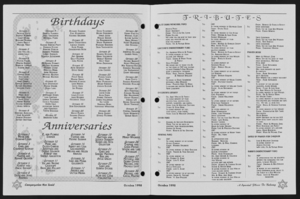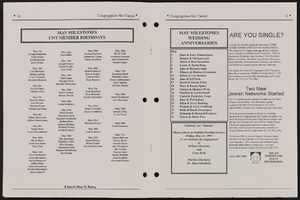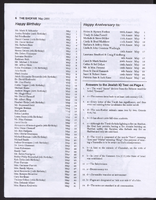Search the Special Collections and Archives Portal
Search Results

Meeting minutes for Consolidated Student Senate, University of Nevada, Las Vegas, May 04, 1982
Date
Archival Collection
Description
Text
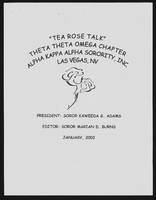
Alpha Kappa Alpha Sorority, Theta Theta Omega Chapter "Tea Rose Talk" newsletters
Date
Archival Collection
Description
From the Alpha Kappa Alpha Sorority, Incorporated, Theta Theta Omega Chapter Records (MS-01014) -- Chapter records file.
Text

Transcript of interview with David Straus and Heidi Straus by Barbara Tabach, November 6, 2015
Date
Archival Collection
Description
In this interview, the Straus? discuss the joys of growing up in Las Vegas during the 1960s and 1970s, and the changes within the community over time, especially in educational opportunities. Both talk about Joyce Straus? career as artist and art educator, and the influence she had on their lives. They also remember Heidi?s father, Jay Sarno, and the impact he had on the local gaming industry. There is also discussion of the founding of Congregation Ner Tamid, the role of Jewish women?s philanthropy within the community, as well as the establishment of The Meadows School.
Text
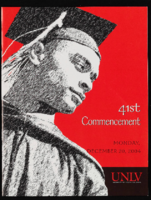
University of Nevada, Las Vegas (UNLV) 41st commencement program
Date
Archival Collection
Description
Commencement program from University of Nevada, Las Vegas Commencement Programs and Graduation Lists (UA-00115).
Text
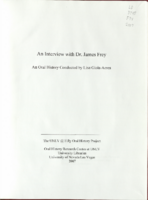
Transcript of interview with Dr. James Frey by Lisa Gioia-Acres, February 14, 2007
Date
Archival Collection
Description
Text

Kings Row Trailer Park Neon Survey document, September 14, 2017
Date
Archival Collection
Description
Site address: 3660 Boulder Hwy
Sign owner: Kings Row Trlr Pk Inc
Sign details: This property is still functioning as a mobile home park along Boulder Highway. They are one of the largest RV parks in Southern Nevada and within a close distance to downtown and Boulder Station Casino. They advertise that they have some of the best deals in town as well as about 200 spaces available. They have been operating in Las Vegas for more than 60 years.
Sign condition: 5 - in great condition, well maintained
Sign form: Roadside pole with a message center and directional elements
Sign-specific description: This sign is made up of many different small cabinets. The top is a painted crown that is plastic and backlit. This sits on top of a red minimal arrow sign that points to the direction of the trailer park. This sign has yellow incandescent light bulbs lining the edge with "Kings Row" painted in white paint on the top of the sign, "Trailer Park" painted in bold yellow text in the center, and the text is outlined with neon tubes. The cabinet under this is a long, red trapezoid with "OVERNITES" painted on it in bold white text that is also outlined with neon tubes. Under this is what appears to be an iron flourish on top of another plastic backlit sign. This sign as "RV SPACES" painted on it in bold red text over yellow paint, "INDOOR HOMES TRAILERS CAMPING" in bold red text against a white background, and "MOBILE HOME SPACES POOL REC HALL" in bold red text against a yellow background. Under this is another iron flourish. Following that sign is a plastic backlit reader board. Under that is a plastic backlit sign with "CAMPERS" in white text and underlined against a red background. Finally, there is another plastic sign in the shape of an arrow with "Kings Row" in a light blue script, "ENTRANCE " in red, and "TRAILER PARK" in black inscribed on it.
Sign - type of display: Neon, incandescent, backlit
Sign - media: Steel and Plastic
Sign - non-neon treatments: Paint
Sign environment: This property sits along Boulder High way and near many other RV rental businesses. It is also down the street from Boulder Station Hotel & Casino.
Sign - date of installation: Possibly c. 1962
Sign - date of redesign/move: Current sign not the original, which was a long rectangular shape cabinet
Sign - thematic influences: This sign is very unique to the RV park. To emphasize the "Kings Row" theme, the crown perched on the top of the sign is designed to help with this. Much of this sign is used to tell motorists and pedestrians what the property has.
Sign - artistic significance: This sign is elaborate. There are many different elements to this sign overall. This sign is that there is a crown to signify the royal theme of this property, possibly as a way to differentiate from other RV park signs around town.
Survey - research locations: Kings Row website, assessor's website
Surveyor: Lauren Vaccaro
Survey - date completed: 2017-09-14
Sign keywords: Neon; Incandescent; Backlit; Steel; Plastic; Paint; Pole sign; Roadside; Directional; Reader board
Text
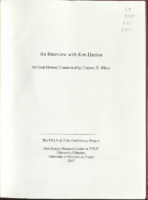
Transcript of interview with Ken Hanlon by Claytee D. White, November 29, 2006
Date
Archival Collection
Description
Text

